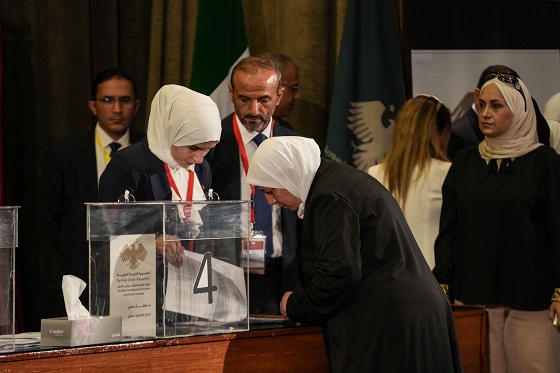Syria’s parliament few women
Damascus (dpa) — Syrian authorities on Monday announced the results of an indirect vote for a new parliament, an election that came nearly a year after the overthrow of former president Bashar al-Assad.
The Election Commission for the People’s Assembly, formed by transitional President Ahmad al-Sharaa in March, released the names of 140 winners from 50 electoral districts following Sunday’s vote.
There was strong representation for Sunni, Sunni conservative and tribal figures, while minorities and women secured relatively few spots.
According to the commission, only six women, two Christians and four Alawites — the sect to which al-Assad belonged — won seats in the 210-member parliament.
Commission spokesman Nawar Nijmeh acknowledged that women’s representation “did not reflect their role in Syrian society.”

Speaking at a press conference on Monday evening at the People’s Assembly headquarters, he also described Christian representation as “weak,” given the size of the community in Syria.
But Nijmeh expressed confidence that President al-Sharaa would address these imbalances when appointing the remaining third of assembly members.
Observers say al-Sharaa may still appoint more minorities when he names the final 70 members of the legislature next week, most of whom are expected to be loyal to the new authorities.
Ordinary Syrians did not vote directly. Instead, a multi-stage process was introduced in which government-appointed electoral bodies selected electors, who then chose the legislators in the final round.
Observers note that the system favours well-connected figures and nepotism, echoing the tightly managed politics of the al-Assad era.
Al-Sharaa, whose Hayat Tahrir al-Sham (HTS) movement toppled the al-Assad regime in December, said on Sunday that the election reflected “the transitional phase Syria is experiencing.”
Adding to the uncertainty, elections did not take place everywhere. Voting was postponed in Sweida and in parts of Hassakah and Raqqa, citing security concerns. These areas are home to Druze and Kurdish communities often at odds with Damascus, leaving their future representation in parliament unclear.
©2025 dpa GmbH. Distributed by Tribune Content Agency, LLC.


